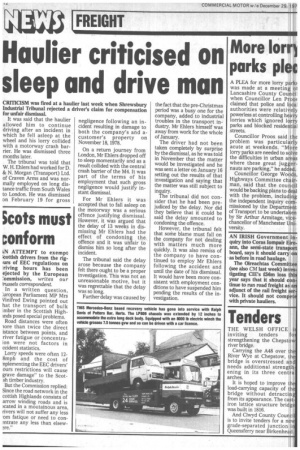ASX FREIGHT
Page 14

If you've noticed an error in this article please click here to report it so we can fix it.
Haulier criticised on sleep and drive man
CRITICISM was fired at a haulier last Industrial Tribunal rejected a driver's for unfair dismissal. week when Shrewsbury claim for compensation It was said that the haulier allowed him to continue driving after an incident in which he fell asleep at the wheel and his lorry collided with a motorway crash barrier. He was dismissed three months later.
The tribunal was told that W H. Ehlers had worked for D. & N. Morgan (Transport) Ltd. of Craven Arms and was normally employed on long distance traffic from South Wales to London. He was dismissed on February 19 for gross negligence following an incident resulting in damage to both the company's and acustomer's property on November 18, 1978.
On a return journey from London, Mr Ehlers dropped off to sleep momentarily and as a result collided with the central crash barrier of the M4. It was part of the terms of his employment that such gross negligence would justify instant dismissal.
For Mr Ehlers it was accepted that to fall asleep on the motorway was a serious offence justifying dismissal. However, it was argued that the delay of 13 weeks in dismissing Mr Ehlers had the effect of condoning the offence and it was unfair to dismiss him so long after the incident.
The tribunal said the delay arose because the company felt there ought to be a proper investigation. This was not an unreasonable motive, but it was regrettable that the delay was so long.
Further delay was caused by the fact that the pre-Christmas period was a busy one for the company, added to industrial troubles in the transport industry. Mr Ehlers himself was away from work for the whole of January.
The driver had not been taken completely by surprise by the dismissal, as he was told in November that the matter would be investigated and he was sent a letter on January 16 setting out the results of that investigation and saying that the matter was still subject to inquiry.
The tribunal did not consider that he had been prejudiced by the delay. Nor did they believe that it could be said the delay amounted to condoning the offence.
However, the tribunal felt that some blame must fall on the company for not dealing with matters much more quickly. It was also remiss of the company to have continued to employ Mr Ehlers following the accident and until the date of his dismissal. It would have been more consistent with employment conditions to have suspended him pending the results of the investigation.












































































